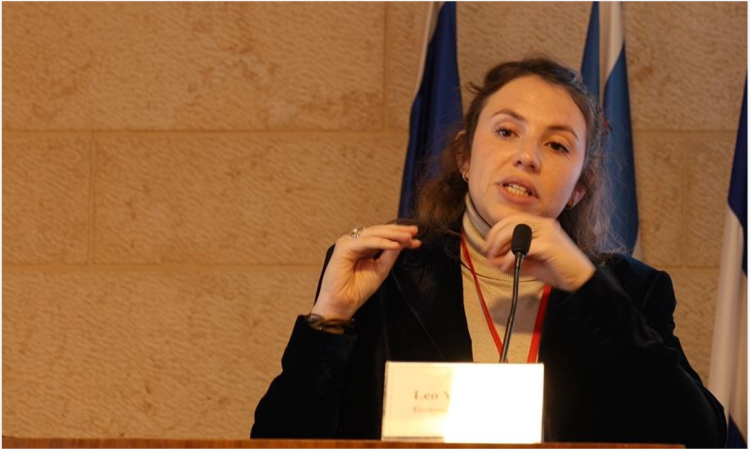Israeli trade and business groups are advancing initiatives to deepen economic ties with Africa, aiming for mutual growth and development.
Representatives from major Israeli organizations, including the Manufacturers Association of Israel, the Federation of Israeli Chambers of Commerce, the Federation of the Binational Chamber of Commerce in Israel, and the Africa, Latin America, and Caribbean Economic Division at the Ministry of Foreign Affairs, discussed their objectives in a roundtable meeting with African journalists in Jerusalem.

Leo Vinovezky, Director of Africa, Latin America, and the Caribbean Economic Division, emphasized Israel’s innovative ecosystem as a foundation for cooperation in areas like agriculture, water management, cybersecurity, and tourism.
“We’re advancing economic ties with Africa through diplomatic channels, government-to-government (G2G), and business-to-business (B2B) initiatives,” Vinovezky said. “Our goal is to showcase Israel’s expertise while learning from Africa’s unique contributions.”
With over 100 Israeli companies operating in 55 African nations, Vinovezky highlighted the long-standing cooperation between Israel and Africa, underscoring the mutual benefits in manufacturing, technology, and environmental management.
“Israel’s presence in Africa demonstrates our commitment to creating sustainable partnerships that foster economic growth and innovation,” he added, advocating for continued dialogue to promote shared prosperity.
Dan Catarivas, President of the Federation of the Binational Chamber of Commerce in Israel, discussed the role of the Israel-Africa Chamber of Commerce in fostering partnerships and organizing trade delegations.
“Although trade volumes are still modest, there is significant potential for growth in innovation, investment, and trade diversification,” Catarivas noted. He emphasized Israel’s expertise in agriculture, technology, and capacity building as complementary to Africa’s development needs.
Catarivas highlighted Israeli innovations, such as drip irrigation, that address water scarcity and enhance agricultural productivity, offering practical solutions for Africa.
However, he also acknowledged challenges like bureaucratic obstacles, cultural differences, corruption, and the need for legal predictability, which must be tackled to strengthen trade relations.
He attributed Israel’s economic success to its focus on research and development, which has consistently ranked the highest globally as a percentage of GDP for over 15 years.
“Israel’s resilience stems from necessity-driven innovation, creating an ecosystem that fosters technological breakthroughs and economic growth,” he said.
He also noted that Israel has maintained business continuity during conflicts by adapting workforce strategies, such as mobilizing pensioners, utilising advanced technologies, and recruiting skilled foreign workers, including Africans.
“Necessity is the mother of creativity. Israel’s innovations, born out of resource scarcity, can serve as a roadmap for sustainable development in other economies,” Catarivas concluded.
The roundtable discussion underscored the potential for Israel and Africa to build stronger economic ties, leveraging innovation and collaboration to drive shared prosperity.
























































![[FREE FREE MONEY] Predict and Win a Guaranteed GH¢200 From Us EVERY WEEK](https://wordpress.ghanatalksradio.com/wp-content/uploads/2022/02/Predict-and-Win-Final-09-03-2021-218x150.jpg)
![[Predict & Win – 8th/Oct.] WIN A Guaranteed ¢200 From Us This Week](https://wordpress.ghanatalksradio.com/wp-content/uploads/2021/10/maxresdefault-16-218x150.jpg)
![[Predict & Win – 2nd] WIN A Guaranteed ¢200 From Us This Week](https://wordpress.ghanatalksradio.com/wp-content/uploads/2021/09/maxresdefault-50-218x150.jpg)
![[Predict & Win – 25th] WIN A Guaranteed ¢200 From Us This Week](https://wordpress.ghanatalksradio.com/wp-content/uploads/2021/09/maxresdefault-36-218x150.jpg)
![[Predict & Win – 18th] WIN A Guaranteed ¢200 From Us This Week](https://wordpress.ghanatalksradio.com/wp-content/uploads/2021/09/maxresdefault-23-218x150.jpg)








![[National cathedral] See full list of churches that have contributed since 2018](https://wordpress.ghanatalksradio.com/wp-content/uploads/2020/09/Ghana-National-Cathedral-GhanaTalksRadio-100x70.jpg)



